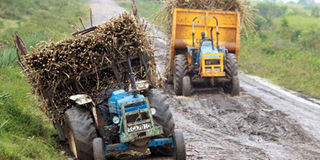Proposed regulations could send local sugar industry to extinction

Tractors carrying sugarcane on their way to Muhoroni Sugar Company on September 12, 2016. PHOTO | FILE | NATION MEDIA GROUP
What you need to know:
- Up to six million Kenyans draw a livelihood from Kenyan sugar.
- Farmers still use low-yield seeds, meaning that Kenya produces far less sugar per hectare than any competitor.
Kenya’s sugar industry has many natural advantages, almost all of which have been undermined by policy and public mismanagement that has seen its productivity slump. As a result, when import protection ends, supposedly next year, the industry will be immediately undercut by far cheaper imported sugar with huge costs to the country.
A quarter of a million farmers grow sugarcane. Up to six million Kenyans draw a livelihood from Kenyan sugar.
IMPORT COSTS
The nation saves Sh40-55 billion a year in import costs by using locally produced sugar — which matters more as our trade deficit continues to grow and place downward pressure on the value of the shilling.
Yet, in its bid to remedy the decline in the industry, the government has drawn up regulations that appear unjustified and inexplicable.
The Common Market for Eastern and Southern Africa (Comesa) has warned that there will be no further extensions in protecting domestic sugar production from imports, yet Kenyan sugar costs $870 (Sh87,000) a tonne to produce compared to $350 in Malawi and $400 in Egypt. There is, therefore, no possibility of Kenyan sugar competing against imports without the cost of production falling dramatically. That makes it a top priority for the new regulations to reduce production costs.
LOW YIELD SEEDS
Yet, the proposed controls comprise a peculiarly old-fashioned model of expensive (for taxpayers) state intervention that will further load costs and actively prevent the key corrections that can reduce our production costs.
The starting point for Kenya’s excessive costs is seeds. Farmers still use old-fashioned, low-yield seeds, meaning that Kenya produces far less sugar per hectare than any competitor.
A clear jump-start would have come from regulations that encouraged entrepreneurs to produce any of the 14 new high-yield seeds developed by the Sugar Research Institute (SRI) and already released for commercial production. Likewise, delivering on the Crops Act’s commitment to extension services to get farmers switch to better seeds would even double yields.
DEAD HAND
Instead, the regulations take sugarcane seed production away from the Kenya Plant Health Inspectorate Service (Kephis), which handles all of the country’s seed licensing, and puts it under the Sugar Directorate.
Setting up a department in the directorate with the requisite technical capacity, expertise and infrastructure will be costly and time consuming and promises delays and disruptions.
The next ‘dead hand’ is the mismanagement and inefficiency of our sugar mills. We produce around 5.3 million tonnes of sugarcane a year for 16 mills while Egypt produces only half as much, at 2.8 million tonnes, but has 14 factories.
Egypt produces nearly five times the sugar that we do — 2.3 million tonnes, compared to Kenya’s 0.5 million tonnes. Its mills are larger and newer and crush better-quality sugarcane more efficiently. However, the regulations add a framework that is proven to deter farmers and create disincentives to millers.
ZONING
They introduce zoning — meaning a farmer is assigned just one mill to sell to. In other countries, it drove farmers out of production. It ruined a once-thriving industry in Australia; when it was abandoned, raw sugar production doubled in five years. Countries such as Pakistan, India, and South Africa have all suffered from it.
The new rules also require investors to have high-powered management teams up to two years before getting licences or going into operation and build sugar mills ahead of licensing.
And they are illegal. Besides breaching the Constitution and other laws, they did not undergo the required impact assessment. The Parliamentary Committee on Delegated Legislation is due to review this decision to ‘forget’ to carry out a cost-benefit analysis or comparative assessment of other policies.
The six million Kenyans hope for a more serious attempt at cutting sugar production costs.
Mr Arum is the co-ordinator, Sugar Campaign for Kenyan cane growers (Sucam). [email protected]




